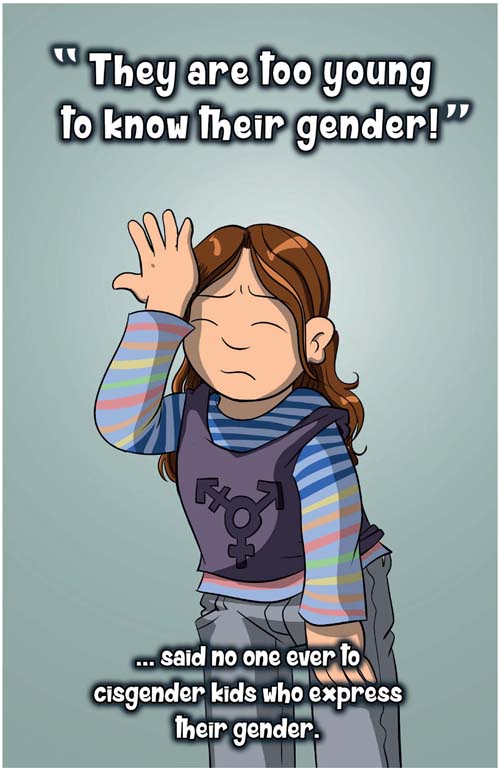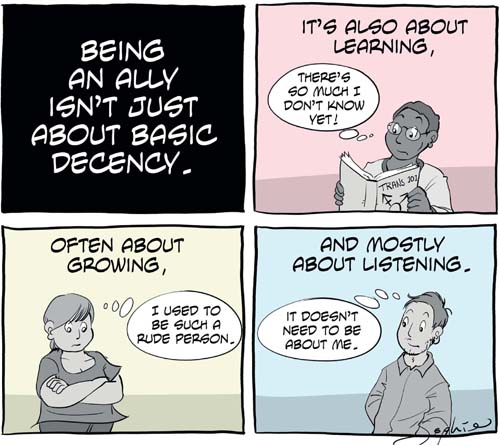
Appendix: Young
Trans Kids and How
to Support Them
COMING OUT AT AN EARLY AGE
This chapter is intended for parents and people who are caring for very young trans people and might need some advice on how to deal with it and what to expect.
WHEN AND HOW DO THEY KNOW?
There are many misconceptions about when a trans person really knows who they are. It’s fair to say that it differs between people, but children in general are quite perceptive and they can understand themselves in relation to gender from as young as 3–4 years old.
When gender is constantly being presented to you in forms of clothing, toys, behaviour and expectations, kids will generally lean towards those that fit with their inner sense of self. Society is constantly pushing ideas of gender onto kids, so in the case of trans kids it might be their only way of expressing their true identity to align themselves with stereotypical behaviour of the gender they know themselves to be. Even so, this isn’t a steadfast rule at all and kids can play with whatever they want. Falling into these stereotypes can be so boring, and toys are in no way an indicator of someone’s gender! All children should be free to play or do whatever feels good to them, without having ideas of gender or sexuality pushed upon them.
Kids who are trans will usually vocalise the fact they are trans, saying that they are in fact a different gender than the one they were assigned, for example: ‘Mummy, I’m a boy’ or ‘When will I turn into a girl?’ And it isn’t just one flippant comment; they usually insist on this quite often and might even say that they want to cut their genitals off or they wish they could grow certain things. It appears as a deep-rooted distress about themselves and their body that is quite persistent. Often they also denounce the stereotypical clothing, toys or expectations put upon them according to their assigned gender as a way to retaliate or send a message. This is way beyond a girl simply being a tomboy or a boy being a bit effeminate. It’s about a deep inner sense of self that the kids can feel very strongly. It’s important not to brush it off, to let them explore their gender identity and expression and to reassure them. Making them feel ashamed or wrong about having these feelings can cause serious harm to them.

Sophie Labelle, Assigned Male Comics
WHAT DO I DO?
All you ever have to do as a parent is to support your child and make sure they’re happy. Nothing is going to happen right away. Letting your child explore and experiment with expression is the best thing that you can do, and forcing them to wear or do something they don’t want is quite distressing for them and can cause them harm. You can usually tell what makes your child happy and what doesn’t, so just make sure you’re allowing your kid to explore their gender identity and expression. Just because they are gender non-conforming doesn’t necessarily mean that they are in fact trans, but your kid will most likely be very vocal about it if they are and you’ll know.
Going to a gender clinic to speak to health care professionals is always good, as they can give you further advice on how to deal with things. And don’t worry, nothing is going to happen right away! At an early age (before puberty) it’s more about allowing the kid to express themselves, perhaps choose a new name and be accepted as the gender that they know themselves to be. There are no medical interventions or anything at this point. The first time for anything like that isn’t until they start to hit puberty. If they are adamant on who they are and want to start hormone blockers (see Chapter 2 for further information), these can be accessed through the NHS’s Gender Identity Development Service (http://gids.nhs.uk) in the UK (or similar services in other countries).
But for now, it’s all just about supporting your kid in their journey and making sure you aren’t clipping their wings. Not being able to express yourself and be your authentic self can be extremely traumatising for trans kids and they really need support. Trans kids who don’t get support end up feeling very distressed and depressed and might develop other mental health issues or even try to take their own lives. Without wanting to sound too serious or dramatic, it really is a matter of life and death for trans people. Most trans people have come to the point of having to decide whether they want to come out and be their authentic selves or just not live at all. Trans children and teenagers who aren’t supported or don’t get the support they need are no exception. It’s really a matter of wanting to have a child who is allowed to be themselves and feel happy, as opposed to suppressing them and forcing them to internalise this, causing serious negative effects on their mental health and inner turmoil.
Fox, co-author and non binary trans person
Growing up I was seen as the naughty one, the black sheep of the family, simply because I wouldn’t conform to gender stereotypes. I knew I wasn’t a girl, and was hyper aware of the way boys and girls were treated differently, each with a different set of expectations. I felt so upset about having to wear dresses and the pain and punishment for not conforming. I cannot fix my childhood, but there’s no need for anyone else’s child to suffer in this way. There is so much information and support available now and we are experiencing a renaissance in our understanding and expression of gender.
ALL TRANS PEOPLE WERE KIDS ONCE
Kids know who they are and almost any trans person out there can tell you that they were once a trans kid as well. The difference is that they weren’t able to vocalise it because they didn’t have the words, the opportunities or the acceptance that we have today. So kids coming out at a younger age isn’t because it’s a fad or because something is being instilled in them – it’s because they have access to language, opportunities and live in a more open society where they are able to articulate these feelings.
Trans people who are advocating for trans kids’ access to services aren’t just doing it for mischievous reasons or because they have bad intentions. It’s because they know what it’s like not to be able to express yourself or be allowed to explore who you are. They know what it’s like to be made to feel ashamed of yourself and how you feel, and they don’t want anyone to have to go through that. It has left serious mental scars and damage on some people and all they want is the best for them. It’s not about rolling kids to surgery, it’s about allowing everyone to explore themselves, their identity and expression. If it turns out that they are trans, then they need the support. If they aren’t trans, then they’ve still had the opportunity to be themselves regardless. No one loses out and nothing bad is going to happen by allowing kids to explore.
For more support and advice for families in the UK, we recommend contacting the organisation Mermaids (see Chapter 2 for more information).

Sophie Labelle, Assigned Male Comics